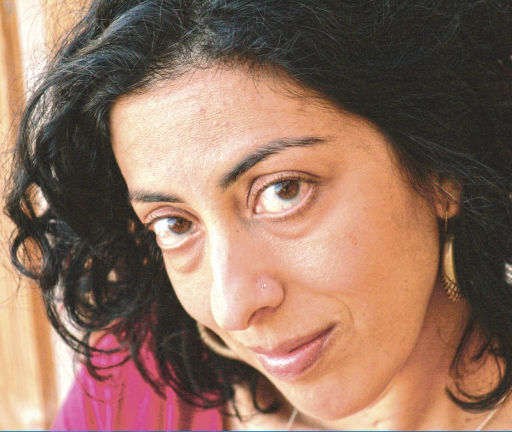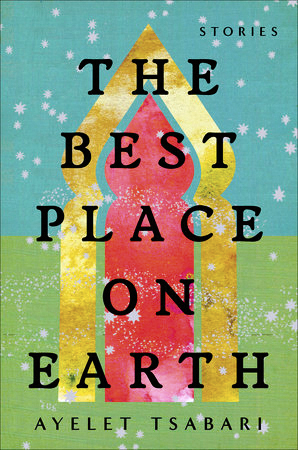‘To tell Mizrahi stories’

By Sandee Brawarsky, New York Jewish Week
To read Ayelet Tsabari’s stories is to walk right into the living room of an elderly Yemenite grandmother cared for by a young Filipina woman in Rosh HaAyin, or a loud Tel Aviv bar filled with soldiers in varying degrees of off-duty, or to have tea in a backyard garden on an island off Vancouver, where license plates read, The Best Place on Earth.
Born in Israel and now living in Toronto, Tsabari writes with an uncommon immediacy and energy. As she tells me, she’s a writer with a mission — “to tell Mizrahi stories,” referring to Jews of Middle Eastern and North African descent, who were largely absent from the books she read growing up. While she’s writing though, she’s not thinking about a specific message.
“If I did, it wouldn’t make for a good story,” she says. “When I write, I just write.”
Tsabari will close this year’s JCC Cultural Arts and Book Fest with a Dec. 8 event at the Dayton Woman’s Club.
She is the recipient of the 2015 Sami Rohr Prize for Jewish Literature (with its $100,000 cash award) for her debut collection of stories, The Best Place on Earth.
Tsabari grew up in Petah Tikveh, outside of Tel Aviv, with five siblings in her Yemenite family. She sees herself in all of the characters in this collection, and admits a soft spot for the sensitive young boy Uri in The Poets in the Kitchen Window.
That story is set during Operation Desert Storm, when Uri and his family carry their gas masks everywhere and frequently hear the sirens that send them into sealed rooms and underground shelters.
Initially Uri hides his love of poetry so that he isn’t made fun of in school, but when his sister brings him a volume of poetry by an Iraqi writer who found inspiration in the streets of their Ramat Gan neighborhood, he begins filling notebooks with new poems and images.
Uri’s sister has just returned from India; his mother is in a psychiatric hospital and his father is largely absent, as “poems tugged at him.”
The author also mentions the young narrator in Warplanes who, like Tsabari, lost her father during the time of the Lebanon War.
The narrator laments that he doesn’t get the attention or honor that those who are war heroes (and their families) receive; her beloved father died of a weak heart. The story takes place in September, just before Rosh Hashanah, when it’s not supposed to rain, but the air feels heavy with moisture, “like being draped in a sheet just out of a washing machine.”
Tsabari’s father — to whom the book is dedicated — was a lawyer and also a poet. In an early poem he wrote, “A poet’s craft is an artist’s kingdom/not for you, son of Yemen.” That line breaks her heart. Haim Tsabari published one poem in 1967. After he died, his friends published a volume of his poetry.
 Her stories are peopled with the children and grandchildren of immigrants from Yemen, Iraq and Morocco, children of Sinai settlers, illegal workers, displaced and transient Israelis and others who, like the title of one story, have been Invisible.
Her stories are peopled with the children and grandchildren of immigrants from Yemen, Iraq and Morocco, children of Sinai settlers, illegal workers, displaced and transient Israelis and others who, like the title of one story, have been Invisible.
In these stories, family ties — between siblings, between parents and children — are sometimes stretched and pulled, but they are elastic, with room to bounce back and chances for forgiveness.
Tsabari has been writing since she was a child. Even before she knew how to write, she would create comic strips and tell stories. When she was 10, she had her first publication in an Israeli children’s magazine.
Although her native language is Hebrew, Tsabari now writes in English, as she has been doing since 2006. (She has lived in Canada for 17 years.)
“It wasn’t a conscious decision,” she explains. “There was no definitive moment. I went a few years without writing at all. I felt lost between languages — I wasn’t using Hebrew that much and my English wasn’t good enough, and I felt at the time that it would never be good enough. It was a painful and lengthy process.”
Eventually, she says that she had to go for it, to risk the ridicule. “It’s a good way to keep you humble,” she says.
“What I miss most about Hebrew is something not really identifiable. It’s what you miss at home, the feel of it, the smell of it,” she says, adding, “There’s something very comfortable about Hebrew. Like an old shirt.”
At times, “Hebrew butts in. A word, a phrase. I just let it. I don’t like to interfere too much and will write the Hebrew words in English lettering.”
Does she think about living in Israel again? “All the time. I wish I had an easier time with committing to just staying where I am. I’m happy. Canada is a great country. Wonderful things happened to me in Canada,” she says. While she knows people who are content where they are, she is tortured. “I struggle every time I go, for a long period of time. I think, I could do this. I could be home again.”
So how did she end up in Canada, married to a Canadian man, raising their 2-year-old daughter — she speaks Hebrew to her — in Toronto?
“There’s always a guy,” she laughs. In her 20s, she drifted, like many Israelis, to India; she met a Canadian man there and moved back to Vancouver with him. “It wasn’t a calculated plan, I wasn’t thinking of moving for good, but why not?” The relationship ended, and she stayed. She moved to Toronto six years ago.
When she began writing in English, she wanted to fit in, but she became increasingly aware that she wasn’t North American. Rather, she recognized that her heritage and upbringing shaped her personality and informs her writing, both in content and style.
She has long loved the Bible — she’s admittedly not a religious person but sees no contradiction in this. She thinks of much Jewish writing as having “a sentimental tone, a little bit somber, with longing. I feel like there’s much of that in my writing, and also the sense of drama and conflict. Those passions are very Israeli.”
In her office, there’s a large mirror and she makes use of it. She used to act, and she speaks certain lines out loud as she is writing. She’ll look at the mirror to be able to describe a certain gesture or facial expression and to create realistic dialogue.
In addition to writing, Tsabari takes photographs, and when she was “between languages” she made some documentary films.
She says that photography feeds her writing. “It’s a break from words. It’s nice to see, nice not to speak. The quietness of it is very appealing. I have been told that my writing has a bit of a cinematic quality. You can see that I see the world in a very visual way. I’m very attentive to sensory details, not just visually, but smell is important, too. I create a picture.”
Her writing has the poetic quality of someone who sees deeply and with compassion, ever aware of her surroundings. She stays with her literary images for an extra second or two, adding a layer of description and intensifying the moment.
During her stay in Israel, she interviewed elderly Yemenite women around the country, taking down their life stories, songs, rituals, beliefs and memories, and taking their photographic portraits. The women are mostly illiterate, and their stories are largely unknown and, as Tsabari remarks, “on the verge of being lost.” This is part of a decade-long documentary project.
The recipient of several Canadian literary awards, she is now working on a memoir in essays and a novel. In Toronto, she teaches creative non-fiction writing, which she loves doing, and also looks forward to taking a break to devote full time to writing, thanks to the Rohr Prize.
The JCC’s Cultural Arts & Book Fest presents author Ayelet Tsabari on Thursday, Dec. 8 at 7 p.m. at the Dayton Woman’s Club, 225 N. Ludlow St., Dayton. $5 in advance, $8 at the door. R.S.V.P. to 610-1555 or at jewishdayton.org.
To read the complete December 2016 Dayton Jewish Observer, click here.

